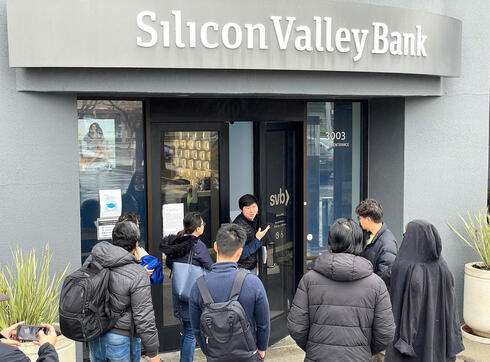
Israeli startups scrambling after Silicon Valley Bank collapses
Israeli venture capital funds held emergency discussions on Saturday to formulate measures to help Israeli startups who cannot withdraw money from their accounts
A source close to the Federal Deposit Insurance Corporation (FDIC) told a group of investors on Saturday that the regulator has already succeeded in realizing half of Silicon Valley Bank’s (SVB) assets. According to this estimate, account holders will receive their insured deposits, up to $250,000, on Monday, and later this week will also receive at least half of their total deposits in the bank. Customers who have credit in SVB will be able to offset the deposit against the debt and thus minimize the damage.
An especially high rate of 96% of deposits at the bank are believed to be higher than $250,000 and therefore are not insured. The insurance ceiling is determined according to the average deposit amount in commercial banks that mainly serve households. Unlike them, in SVB the vast majority of accounts belong to high-tech companies and venture capital funds.
Israeli venture capital funds held emergency discussions on Saturday to formulate measures to help Israeli startups who cannot withdraw money from their bank accounts. The most urgent problem is the payment of salaries to startup employees in the U.S. this Wednesday as this requires an active U.S. bank account.
Several funds in the U.S. have already declared that they will transfer money to their companies to pay the salaries, but many venture capital funds also hold their money in SVB so they too do not have immediate access to it.
It is estimated that Israeli companies managed to withdraw more money on Friday than their American counterparts because they have additional accounts in Israel to which they could make transfers quickly. Unlike them, American startup companies could not make immediate withdrawals because they did not have an additional bank account and the process of opening an account takes several days.
Related articles:
Meanwhile, David Cohen, General Manager of SVB Israel, who declined to answer Calcalist’s questions on the matter, posted on Saturday his first public response to the collapse.
“Over 12 years ago, I started my chapter at SVB with the aspiration to build a solid and trusted brand for SVB in Israel.
“With amazing team work and hunger, we managed to convince the Israeli innovation ecosystem to trust us and the SVB platform as its true long-term partner. It took us years of hard work to add client after client and to win loan after loan to position SVB as the “default” partner for our friends in the VC industry and to its portfolio companies,” Cohen wrote on social media.
“The 40 hours that created the disaster of wiping SVB from earth are shocking and sad to me personally, to my team that I love and respect so much, to my colleagues across the globe and from the endless support messages I receive - to the entire industry.
“I want to thank my amazing team, nothing could be achieved without their amazing work, enthusiasm and desire to win and service.
“I would like to take this opportunity to thank all of our clients and friends that have called or texted me and my team to provide us their support in such a complex time.
“Last but not least, a HUGE thank you to my family for the support during these 12 years - I couldn’t do any of this without you.”
SVB became the largest bank to fail since the 2008 financial crisis on Friday, in a sudden collapse that roiled global markets, and left billions of dollars belonging to companies and investors stranded.
California banking regulators closed the bank, which did business as Silicon Valley Bank, on Friday and appointed the Federal Deposit Insurance Corporation (FDIC) as receiver for later disposition of its assets.
Based in Santa Clara, the lender was ranked as the 16th biggest in the U.S. at the end of last year, with about $209 billion in assets. Specifics of the tech-focused bank's abrupt collapse were a jumble, but the Fed's aggressive interest rate hikes in the last year, which had crimped financial conditions in the startup space in which it was a notable player, seemed front and center.
As it tried to raise capital to offset fleeing deposits, the bank lost $1.8 billion on Treasury bonds whose values were torpedoed by the Fed rate hikes.
Silicon Valley Bank's failure is the largest since Washington Mutual went bust in 2008, a hallmark event that triggered a financial crisis that hobbled the economy for years. The 2008 crash prompted tougher rules in the United States and beyond.
Since then, regulators have imposed more stringent capital requirements for U.S. banks aimed at ensuring individual bank collapses won't harm the wider financial system and economy.
The main office and all branches of Silicon Valley Bank will reopen on March 13 and all insured depositors will have full access to their insured deposits no later than Monday morning, the FDICsaid.
But 89% of the bank's $175 billion in deposits were uninsured as of the end of 2022, according to the FDIC, and their fate remains to be determined.
The FDIC is racing to find another bank over the weekend that is willing to merge with Silicon Valley Bank, according to people familiar with the matter who requested anonymity because the details are confidential. While the FDIC hopes to put together such a merger by Monday to safeguard unsecured deposits, no deal is certain, the sources added.
An FDIC spokesperson did not immediately respond to a request for comment.
Reuters contributed to this report
